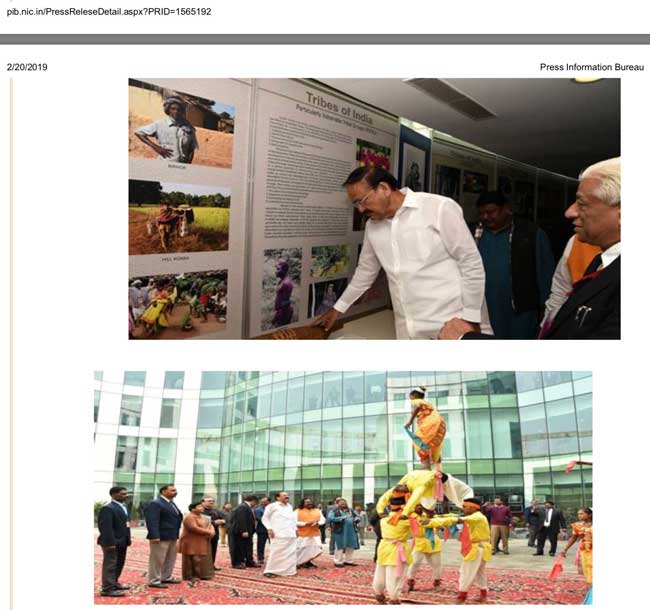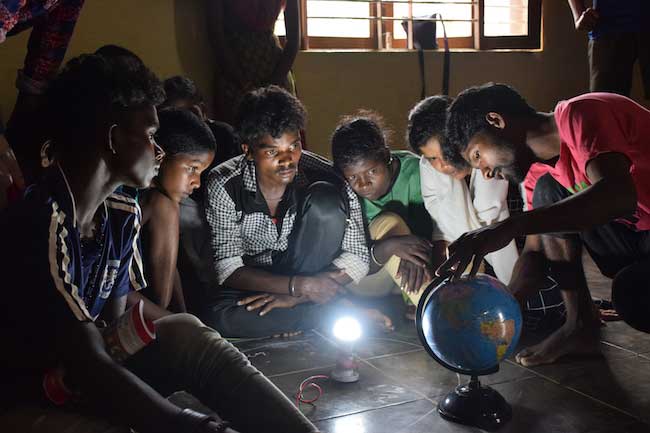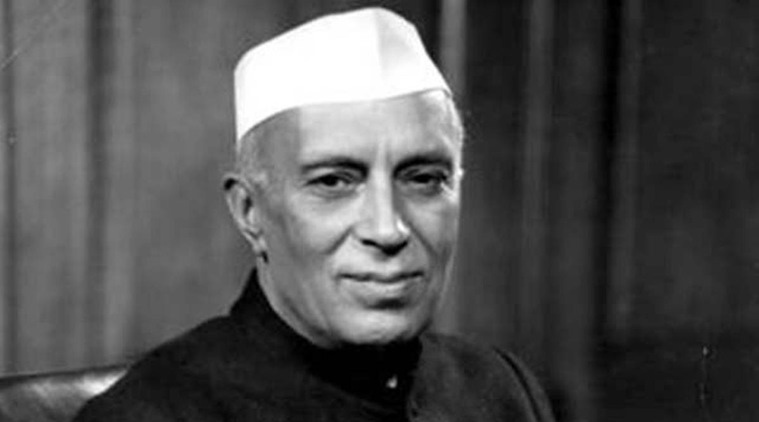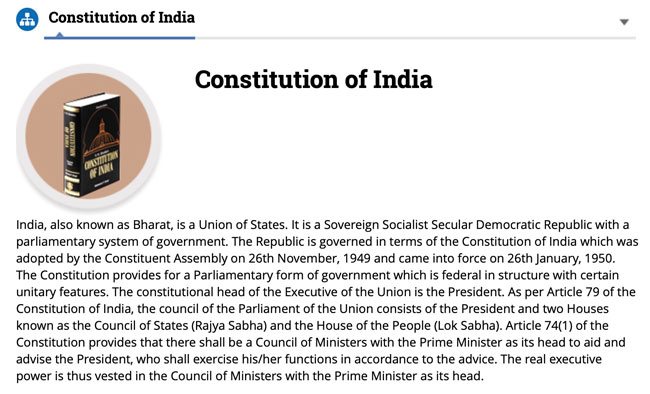
Vice President M. Venkaiah Naidu on India’s Constitutional obligation >>
Vice president delivers “first foundation day lecture of NCST” | To download the official transcript, click here >>
While delivering the Foundation Day lecture, the Vice President asked that we shall first have to give up this hubris of considering tribes backward. Every tribe has a rich and living cultural tradition and we must respect them. He said it not only social courtesy to respect their cultural traditions but it is also our Constitutional obligation. He said as we are looking for ways of sustainable development, these groups can teach us lessons in sustainable development. [T]heir belief in the Nature remains one and firm. There can’t be a better example of Unity in Diversity […]
As the nation commemorates “150 years of the Mahatma Gandhi”, NCST is celebrating fifteen years of its constitution. On this occasion, the Commission brought out a book titled “Janjatiya Swadhinta Sangram” in Hindi. The book, which was released by the Vice President, brings out the little unknown facets of the freedom struggle of tribal people in the country. The book highlights the contribution of tribal uprising against british regime during freedom struggle. It includes articles on Shaheed Veer Buddhu Bhagat, Bhagwan Birsa Munda, Tilka Manjhi, Sidhu Kanhu, Bhumkal Gundadhur, Krantiveer Surendra Sai, Kunwar Raghunath Shah, Vidrohi Tantya Bheel, Amar Shaheed Veer Narayan Singh, Param Balidani Govind Guru and Janjati Veerangana Maharani Durgawati. It is an effort of the Commission to bring out the invaluable contribution and valour of tribal leadership in the freedom struggle of India.
As it is tradition to have a cultural programme in any tribal function, the Foundation Day celebration also showcased the rich tribal cultural heritage in the form of ‘Maweshi Bhil Dance from Gujarat and Rajasthan’. At the same time, a visual exhibition on the Particular Vulnerable Tribal Groups of India was presented by Anthropological Survey of India on the sidelines of Foundation Day Celebration. […]
At the same time, a visual exhibition on the Particular Vulnerable Tribal Groups of India was presented by Anthropological Survey of India on the sidelines of Foundation Day Celebration. […]
Source: M. Venkaiah Naidu (Vice President of India) quoted in “Vice president delivers ‘first foundation day lecture of NCST’: Constitution and Tribes” by Press Information Bureau, National Commission for Scheduled Tribes (NCST), 19 February 2019
URL: https://ncst.nic.in/sites/default/files/2019/Media/2.pdf
Date visited: 4 November 2020
The Adivasis, who have made sacrifices during our freedom struggle were not given their due respect and recognition. The Tribal museum aims at showcasing the involvement of Adivasis in our freedom struggle.
Source: Prime Minister of India in “English rendering of PM’s speech at inauguration of new Civil, Cancer & Eye Hospitals in Ahmedabad” (Prime Minister’s Office Posted On: 04 MAR 2019)
URL: https://pib.gov.in/PressReleaseIframePage.aspx?PRID=1567548
Date visited: 24 February 2021
Research the above issues with the help of Shodhganga: A reservoir of theses from universities all over India, made available under Open Access >>

collaborative YouTube channel: Kaathadi | More resources for the classroom >>
National Commission for Scheduled Tribes NCST 31 May 2020
The framers of the Constitution took note of the fact that certain communities in the country were suffering from extreme social, educational and economic backwardness arising out of age-old practice of untouchability and certain others on account of this primitive agricultural practices, lack of infrastructure facilities and geographical isolation, and who need special consideration for safeguarding their interests and for their accelerated socio-economic development. These communities were notified as Scheduled Castes and Scheduled Tribes as per provisions contained in Clause 1 of Articles 341 and 342 of the Constitution respectively. […] The National Commission for Scheduled Tribes is vested with the duty to participate and advise in the planning process of socio-economic development of STs, and to evaluate the progress of their development under the Union and any State. | Learn more >>
Nehru was fascinated by the spontaneity of tribal culture and their capacity of joy and heroism in spite of their appalling poverty, destitution, and ignorance. […] In Nehru’s view, the process of modernization must not be taken as forcing a sudden break with the tribals past but help them build upon it and grow by a natural process of evolution.
Dr. Chittaranjan Mishra in “Tribal Philosophy and Pandit Nehru” (Odisha Review, November 2017) | Learn more >>

Photo © Indian Express

“India, also known as Bharat, is a Union of States. It is a Sovereign Socialist Secular Democratic Republic with a parliamentary system of government.” – Constitution of India
Source: National Portal of India
Learn more about the Indian Constitution and decisions by India’s Supreme Court >>
Find scholarly books, poetry and fiction relating to tribal culture – Indian publishers
List of sites covered by this Google custom search engine
To find children’s and educational books or search Indian periodicals, magazines, web portals and other sources safely, click here >>
Search tips
Combine the name of any particular state, language or region with that of any tribal (Adivasi) community.
Add keywords of special interest (music, poetry, dance just as health, sacred grove and biodiversity); learn about the rights of Scheduled Tribes such as the “Forest Rights Act” (FRA); and the United Nations “Declaration on the Rights of Indigenous Peoples”, “Universal Declaration of Human Rights”, “women’s rights”, or “children’s right to education”.
Ask a question that includes “tribal” or “Adivasi”, for instance: “Adivasi way of life better?” (or “tribal way of life worse?”)
Specify any particular issue or news item (biodiversity, bonded labour and human trafficking, climate change, ecology, economic development, ethnobotany, ethnomedicine, global warming, hunter-gatherers in a particular region or state, prevention of rural poverty, water access).
For official figures include “scheduled tribe ST” along with a union state or region: e.g. “Chhattisgarh ST community”, “Himalayan tribe”, “Scheduled tribe Tamil Nadu census”, “ST Kerala census”, “Particularly Vulnerable Tribal Group Jharkhand”, “PVTG Rajasthan”, “Adivasi ST Kerala”, “Adibasi ST West Bengal” etc.
In case the Google Custom Search window is not displayed here try the following: (1) toggle between “Reader” and regular viewing; (2) in your browser’s Security settings select “Enable JavaScript” | More tips >>
Note: hyperlinks and quotes are meant for fact-checking and information purposes only | Disclaimer >>